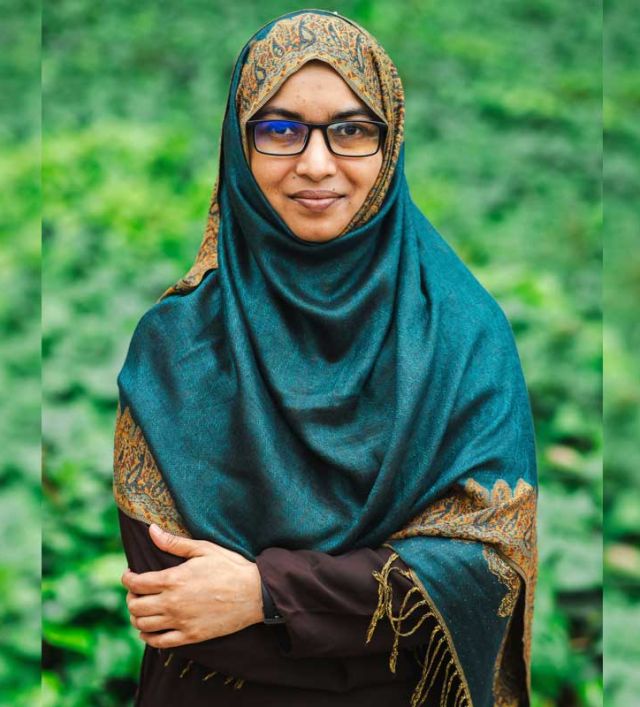
Shaila Niazi – MS/PhD student in Computer Engineering
In Shaila’s own words – Interviewed during 2024 year
- Hometown: Bogura, Bangladesh
- Previous Degrees: Bachelor of Science in EEE, Bangladesh University of Engineering and Technology (BUET).
- Degree Sought from UCSB: 3rd year, PhD (MS/PhD)
- Advisor / Lab or Group Name: Kerem Y. Camsari / OPUS Lab
- ECE Research Area: CE
- Hobbies and Interests: Gardening, Playing Badminton, Traveling, and Reading Storybooks
Shaila’s Research
- Main Area of Research: Machine learning with Probabilistic Computing
- Research Interests: Machine learning, FPGA-based hardware accelerators, CMOS VLSI design, Neuromorphic Computing
- Important Conferences: IEEE International Electron Devices Meeting (IEDM), ML with New Compute Paradigms (MLNCP) at NeurIPS
- Professional Memberships: Institute of Electrical and Electronics Engineers (IEEE)
- Publications: Shaila’s Google Scholar
Favorite things about
- Department: The ECE department offers graduate students diverse and outstanding research opportunities. The faculty members are world-renowned in their fields and strongly encourage the students to join their innovative projects.
- UCSB: It is a beautiful scenic campus with an impressive natural coastal view. Additionally, the support and opportunities served by the staff members are immensely commendable.
- Santa Barbara: The beautiful beaches and wonderful weather of Santa Barbara offer relaxing vibes that are conducive to study or any co-curricular activities.
Shaila and her research
Tell us about your research: My research is focused on probabilistic computing. I’m currently working on FPGA-based hardware acceleration to develop efficient hardware systems for Machine Learning and Artificial Intelligence.
How and why did you get into your area of research? During my undergraduate studies, I was fascinated by the different microcontroller/Arduino projects and CMOS VLSI chip design. This fascination intrigued me to work on FPGA-based hardware accelerators. Fortunately, I got that opportunity in OPUS Lab, UCSB, to materialize my dream.
Why did you select UCSB and CE in regard to your research? UCSB is one of the leading universities for my research interest, and CE facilitates excellent courses and research opportunities in this regard.
What do you find rewarding about your research? Since Moore’s law is about to die, physics-based unconventional computing is the next best alternative to be pursued. Becoming part of this physics-inspired computing community allowed me to collaborate with different world-renowned researchers, which was a rewarding experience.
Furthermore, obtaining and analyzing experimental results along with simulation enhances the knowledge and debugging skills in my field, which is obviously rewarding.
Thoughts on working in a group research environment: Working in a research group environment allows members to learn from each other and gain new skills and knowledge. I always enjoy the group discussion and appreciate others' insights on my research topics. My advisor, Professor Kerem Camsari, is a wonderful person to work with. We have been working together to resolve many challenges since we started with probabilistic machine learning in our group.
UCSB Prides itself on its collaborative atmosphere, give some examples of how you collaborate: Apart from UCSB, we collaborate closely with other renowned groups from different universities, such as Purdue, Stanford, and Tohoku University, and industry, such as Samsung, TSMC, and HP.
Academics at UCSB
Strengths of the graduate program: The ECE graduate program offers numerous research opportunities and a wide range of courses. We get the chance to study alongside and interact with a diverse group of students from various backgrounds and cultures.
Favorite course: Fundamentals of Probabilistic Computing: Hardware to Algorithms (ECE 594V), offered by Professor Kerem Camsari, is one of my favorite courses. This was the first course I took at UCSB, and I was enthralled by Professor Camsari's teaching style and the physics and algorithms of p-computing. It gave me a solid foundation for my own research moving forward.
Describe your Graduate Student Researcher (GSR) and Teaching Assistant (TA) experiences: As a GSR, I mostly study and analyze research papers, code and run experiments, and write papers when we achieve our desired results under the supervision of my PhD advisor. As a TA, I worked for Fundamentals of Logic Design (ECE 15A) twice. I had TA recitation sessions, which included discussing the topics and solving digital logic-related problems covered in lectures. My TA responsibilities also included grading assignments, midterm, and final exam papers.
Life as a graduate student
Quality of life as a graduate student and how you balance school, work, social, and family life: PhD life is stressful and hectic sometimes, making it difficult to balance school, social life, and family life. Nevertheless, try to talk to my parents briefly almost every day and keep in contact with my undergraduate friends. During the weekends, when I have less pressure, I travel to beautiful places in Santa Barbara and the Ventura area. My super nice faculty advisor sometimes arranges get-together parties at his home, which is purely a fun time we always have.
What is your social life like? Since joining UCSB, I have lived in the West Campus Family Student Housing with my husband. On weekends, we sometimes attend a social gathering arranged by other Bangladeshi families and friends.
Tell us about your summer break: Last summer, I had a chance to visit my parents in my home country. This summer, I will mostly spend the time working on my research projects here on campus.
Advice to prospective graduate students: Think about your life and career goals before making decisions about whether to pursue a PhD since it will be a difficult, long journey. Once you are on board, then try to enjoy what you are doing, and maintain a healthy lifestyle balancing your work and family life.
Future Plans...
Where will your research take you next and what are your future career goals I will continue my PhD program and finish my dissertation in the next two years. After graduation, I plan to join an industry or a startup company.